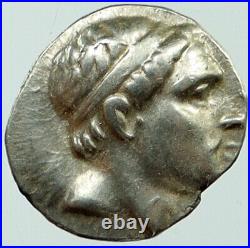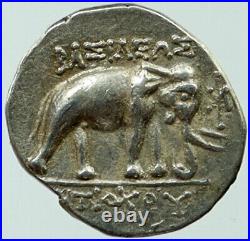


Item: i117915 Authentic Ancient Coin of. King: 222-187 B. Silver Drachm 16mm (3.96 grams) Ostensibly Apameia on the Orontes mint. Reference: SC 1065.6; Houghton, Elephants, Type B; HGC 9, 453a Diademed head to right. Elephant standing to right; monogram to right;?? 222-187, second son of Seleukos II Kallinikos. Succeeded to the throne on the death of his brother Seleukos III Keraunos. When he was only in his 15th year. After defeating (220) Molon, satrap of Media, and his brother Alexander, satrap of Persis. Who had attempted to make themselves independent, he carried on war against Ptolemy. Philopator, king of Egypt. In order to obtain Coele-Seleukia. But was obliged to cede these provinces to Ptolemy, in consequence of his defeat at the battle of Raphia near Gaza. He next marched against Achaios. Who had revolted in Asia Minor. And whom he put to death, when he fell into his hands in 214. Shortly after this he was engaged for 7 years (212-205) in an attempt to regain the E. Provinces of Asia, which had revolted during the reign of Antiochos II Theos. But though he met with great success, he found it hopeless to effect the subjugation of the Parthian. Kingdoms, and accordingly concluded a peace with them. In 205 he renewed his war against Egypt with more success, and in 198 conquered Palestine and Coele-Seleukia, which he afterwards gave as a dowry with his daughter Cleopatra. Upon her marriage with Ptolemy Epiphanes. In 196 he crossed over into Europe, and took possession of the Thracian Chersonese. This brought him into contact with the Romans, who commanded him to restore the Chersonese to the Macedonian. King ; but he refused to comply with their demand ; in which resolution he was strengthened by Hannibal. Who arrived at his court in 195. Hannibal urged him to invade Italy without loss of time ; but Antiochos did not follow his advice, and it was not till 192, that he crossed over into Greece. In 191 he was defeated by the Romans at Thermopylae, and compelled to return to Asia: his fleet was also vanquished in two engagements. In 190 he was again defeated by the Romans under L. Scipio, at Mount Sipylus, near Magnesia, and compelled to sue for peace, which was granted in 188, on condition of his ceding all his dominions E. But was killed by the people of the place (187). He was succeeded by his son Seleukos IV Philopator. In Greek and Roman mythology, Apollo, is one of the most important and diverse of the Olympian deities. The ideal of the kouros (a beardless youth), Apollo has been variously recognized as a god of light and the sun; truth and prophecy; archery; medicine and healing; music, poetry, and the arts; and more. Apollo is the son of Zeus and Leto, and has a twin sister, the chaste huntress Artemis. Apollo is known in Greek-influenced Etruscan mythology as Apulu. Apollo was worshiped in both ancient Greek and Roman religion, as well as in the modern Greco-Roman Neopaganism. As the patron of Delphi (Pythian Apollo), Apollo was an oracular god – the prophetic deity of the Delphic Oracle. Medicine and healing were associated with Apollo, whether through the god himself or mediated through his son Asclepius, yet Apollo was also seen as a god who could bring ill-health and deadly plague as well as one who had the ability to cure. Amongst the god’s custodial charges, Apollo became associated with dominion over colonists, and as the patron defender of herds and flocks. As the leader of the Muses (Apollon Musagetes) and director of their choir, Apollo functioned as the patron god of music and poetry. Hermes created the lyre for him, and the instrument became a common attribute of Apollo. Hymns sung to Apollo were called paeans. In Hellenistic times, especially during the third century BCE, as Apollo Helios he became identified among Greeks with Helios, god of the sun, and his sister Artemis similarly equated with Selene, goddess of the moon. In Latin texts, on the other hand, Joseph Fontenrose declared himself unable to find any conflation of Apollo with Sol among the Augustan poets of the first century, not even in the conjurations of Aeneas and Latinus in Aeneid XII (161-215). Apollo and Helios/Sol remained separate beings in literary and mythological texts until the third century CE. The Seleucid Empire was a Hellenistic state ruled by the Seleucid dynasty founded by Seleucus I Nicator following the division of the empire created by Alexander the Great. Seleucus received Babylonia and, from there, expanded his dominions to include much of Alexander’s near eastern territories. The Greek population of the cities who formed the dominant elite were reinforced by emigration from Greece. Seleucid expansion into Anatolia and Greece was abruptly halted after decisive defeats at the hands of the Roman army. Their attempts to defeat their old enemy Ptolemaic Egypt were frustrated by Roman demands. Much of the eastern part of the empire was conquered by the Parthians under Mithridates I of Parthia in the mid-2nd century BC, yet the Seleucid kings continued to rule a rump state from the Seleukid Kingdom until the invasion by Armenian king Tigranes the Great and their ultimate overthrow by the Roman general Pompey. World-renowned expert numismatist, enthusiast, author and dealer in authentic ancient Greek, ancient Roman, ancient Byzantine, world coins & more. Ilya Zlobin is an independent individual who has a passion for coin collecting, research and understanding the importance of the historical context and significance all coins and objects represent. Send me a message about this and I can update your invoice should you want this method. Getting your order to you, quickly and securely is a top priority and is taken seriously here. Great care is taken in packaging and mailing every item securely and quickly. What is a certificate of authenticity and what guarantees do you give that the item is authentic? You will be very happy with what you get with the COA; a professional presentation of the coin, with all of the relevant information and a picture of the coin you saw in the listing. Additionally, the coin is inside it’s own protective coin flip (holder), with a 2×2 inch description of the coin matching the individual number on the COA. Whether your goal is to collect or give the item as a gift, coins presented like this could be more prized and valued higher than items that were not given such care and attention to. When should I leave feedback? Please don’t leave any negative feedbacks, as it happens sometimes that people rush to leave feedback before letting sufficient time for their order to arrive. The matter of fact is that any issues can be resolved, as reputation is most important to me. My goal is to provide superior products and quality of service. How and where do I learn more about collecting ancient coins? Visit the “Guide on How to Use My Store”. For on an overview about using my store, with additional information and links to all other parts of my store which may include educational information on topics you are looking for. This item is in the category “Coins & Paper Money\Coins: Ancient\Greek (450 BC-100 AD)”. The seller is “highrating_lowprice” and is located in this country: US. This item can be shipped worldwide.
- Composition: Silver
- Era: Ancient
- Certification: Uncertified

